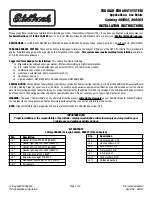
83
Saving fuel
The fuel consumption of your vehicle is depen-
dent on various factors. You can improve your
vehicle's fuel consumption and reduce the
strain on the environment with several mea-
sures, your driving style and regular mainte-
nance.
Removing unnecessary cargo
Additional weight increases fuel consumption.
Removing attached parts following use
Remove auxiliary mirrors, roof or rear luggage
racks which are no longer required following
use. Attached parts on the vehicle impair the
aerodynamics and increase the fuel consump-
tion.
Closing windows and panorama glass
sunroof
An open panorama glass sunroof or an open
window also increases the aerodynamic drag,
and with it the fuel consumption.
Checking tire inflation pressures
regularly
Check the tire inflation pressures at least twice
a month and before starting off on a longer trip
and correct them if necessary.
An insufficient tire inflation pressure increases
the rolling resistance, therefore increasing fuel
consumption and tire wear.
Driving off immediately
Do not allow the engine to warm up by leaving it
running while the vehicle remains stationary.
Instead, drive off immediately at a moderate
engine speed. This enables a cold engine to
reach its operating temperature most rapidly.
Looking well ahead when driving
Avoid unnecessary acceleration and braking by
maintaining a corresponding distance to the
vehicle driving ahead. Driving smoothly and
looking ahead reduces fuel consumption.
Avoiding high engine speeds
Only use 1st gear when starting off. Accelerate
briskly from 2nd gear while avoiding high
engine speeds and shifting up prematurely.
When the desired speed is reached, shift into
the highest possible gear and drive at constant
speed at the lowest possible engine speed.
Always remember: driving at low engine speeds
decreases fuel consumption and reduces wear.
Using overrun conditions
When approaching a red light, take your foot off
the accelerator and allow the vehicle to coast in
the highest possible gear.
On a downhill stretch of road, take your foot off
the accelerator and allow the vehicle to coast in
the suitable gear.
The flow of fuel is interrupted in overrun.
Switching off engine during longer
stops
Switch off the engine during longer stops, e.g.
at traffic lights, railroad crossings or in traffic
jams. You already save fuel from approx. 4 sec-
onds with the engine switched off.
Switching off functions currently not
required
Functions like the air conditioner, seat heating
or the rear-window defroster require a lot of
energy and consume additional fuel. This plays
a major role especially when driving in urban
and in stop-and-go traffic. Therefore, switch off
these functions when they are not really
required.
Having maintenance carried out
Have regular maintenance performed on the
vehicle to achieve optimum the economy and
service life of your vehicle. BMW recommends
having maintenance carried out by a BMW
Sports Activity Vehicle Center. Also observe
the BMW maintenance system, refer to
page
Online Edition for Part no. 01 41 2 602 348 - © 02/09 BMW AG
Содержание 2010 X3
Страница 2: ...Online Edition for Part no 01 41 2 602 348 02 09 BMW AG ...
Страница 10: ...Online Edition for Part no 01 41 2 602 348 02 09 BMW AG ...
Страница 18: ...Online Edition for Part no 01 41 2 602 348 02 09 BMW AG ...
Страница 82: ...Online Edition for Part no 01 41 2 602 348 02 09 BMW AG ...
Страница 92: ...Online Edition for Part no 01 41 2 602 348 02 09 BMW AG ...
Страница 126: ...Online Edition for Part no 01 41 2 602 348 02 09 BMW AG ...
Страница 143: ...Online Edition for Part no 01 41 2 602 348 02 09 BMW AG ...
















































